- Daily & Weekly newsletters
- Buy & download The Bulletin
- Comment on our articles
Why Restless Brussels is on a mission to increase voter participation in municipal elections on 13 October
Since its launch at the end of 2023, restless.brussels has been on a mission to bring the “international community closer to the city”.
Tirelessly staging events – on issues such as mobility, citizen action and the use of English – it also organises meet-ups with local politicians: key figures from major parties in Brussels, who are sharing their policies and their opinions with internationals.
In recognition of its efforts and goals, the non-profit has received a grant from the Brussels region to the tune of €15,000 to promote voter turnout in the capital.
For despite non-Belgians representing around two thirds of the population in Brussels, only 17% turn out to vote in local polls. That’s why the overriding aim of restless.brussels is to increase EU citizen voter participation ahead of municipal elections on 13 October.

It is now stepping up its campaign ahead of the 31 July deadline for voter registration. “We are a missed opportunity from the politicians’ point of view,” says Chris Ruff (pictured), a board member of restless.brussels, who recognises that too many people are not engaging in the political system.
“At the moment Brussels is not fully representative of all the people living here,” Ruff told The Bulletin. “Voting is ultimately power. Within the EU bubble, we’re telling people to vote in the EU elections, yet we’re not voting in the country we live. That’s a paradox we’d like to fix.”
They are not the only ones attempting to reduce the democratic deficit. Politicians of all stripes have been participating in the community events, spotting the potential opportunity to boost their following.
The city is proud of its multicultural population, says Ruff. “We add to the dynamism of the place and contribute to international culture. We have something to offer.”

Debunking the myths
This drive to increase civic engagement is tempered. “We don’t want to appear too pushy, but we have a stake like every other citizen in this city.” Framing issues such as the contentious good move mobility plan is one tactic. The message becomes, “we are actively engaging in things that you care about and committing energy to achieving joint goals.” That’s a different position to be complaining from, points out Ruff. “You and I both care about this place. I love Brussels but there are a few things I’d like to change and I have a perspective from outside that might help you.”
If expats in Brussels have undoubtedly become more integrated, with many adopting Belgian nationality, clichés remain on both sides. Restless is keen to debunk some of the myths. While internationals can be accused of not paying taxes and raising property prices, Belgium is accused of being administratively badly run and Brussels a traffic nightmare. “There’s a grain of truth,” admits Ruff, “but the point is that the more you learn, the more you can do about it.”
One of the many positive notes to arise from the campaigning has been the engagement from the Flemish community. “They feel that they have a similar position in Brussels society as a minority, but a vocal one,” he says.

Breaking down barriers
Restless.brussels was launched in the autumn of 2023, an initiative of Tom Moylan. Now an independent communications consultant, the Irishman spent almost a decade working at the European Commission as a communications adviser.
The non-profit’s six-person board and team of energetic volunteers similarly work in and around the EU bubble. Galvanising skills they practice in their professional lives fuels their mission to break down the barriers between internationals and the city. Meanwhile, volunteers receive campaigning, lobbying and digital media training.
This focus on connecting with people and organisations behind the key issues, as well as mobilising the international community, has proved highly effective. Events, some of which have been online, have been extremely well attended by active audiences.

Ruff continues to be amazed by how many people are attracted by the mission, while clear about his own motivation. The Briton came to Brussels in 2015 on an internship in the Commission. “I got sucked in and eight years’ later I’m a Belgian citizen and have a son with a lady from Barcelona. Now there is only one place that is home for the three of us,” he says.
Having a child in a Belgian school and buying a house was the tipping point for Ruff, who is now the communications director at Digital Europe. “I’m engaging with administration at a level that when you’re in your 20s, you can just skirt over.”
This dichotomy served as the inspiration and motivation for the group, he reveals. “You want to be more involved, it bugs you, and that’s where the restlessness comes from. You don’t want to be clinging on to the side of a country, you want to be involved.”
Ruff is quick to acknowledge the efforts of other groups that have campaigned for voting rights. “We’re standing on the shoulders of many people before, such as #1bru1vote or Vote Brussels,” he says, referring to the citizens’ groups that previously campaigned to increase voter turnout as well as for non-Belgians to vote in Brussels regional elections.
“Restless.brussels is saying why you should vote. That’s why we organise events around topics. We’re trying to get people enthused in the issue and then empowered,” he explains.
There’s equally recognition that the voting deficit in Brussels is not limited to the largely privileged community of expats. “There are lots of different communities in Brussels: Turkish, Congolese, Moroccan, second generation Italian. There’s a huge diversity and we accept that we don’t represent them, so we have to keep things in perspective.”
Upcoming events
13 May, 18.30 Improving your neighbourhood (Woluwe-Saint-Lambert 1200)
Harold Habousha shares tips on how to improve your neighbourhood using official tools (like Fix My Street or lobbying politicians) and less official routes (like local media and protest).
16 May, 18.00 Martin Casier on Brussels’ housing crisis (Brussels 1000)
Vice-president of Brussels’ Part Socialiste (PS) and Brussels Region MP Martin Casier discusses housing in the capital through the lens of eco-socialist policy.
21 May, 19.30 School Streets: Why and how to ask for them (Watermael-Boitsfort 1170)
Renaud Leemans from Les chercheurs d’air makes the case for ‘Rue Scolaire’, low traffic areas around schools.
23 May, 18.30 VoorU: Starting a new political movement in Belgium (Brussels 1000)
Jan Wostyn and Marta Barandiy share their experience of setting up a political party in Belgium.
28 May, 18.30 Marie Lecocq on Crafting a Climate Resilient Brussels (Brussels 1000) Co-President of Ecolo Brussels and regional representative Marie Lecocq shares her vision for a more climate resilient Brussels.
Photos: ©restless.brussels



















